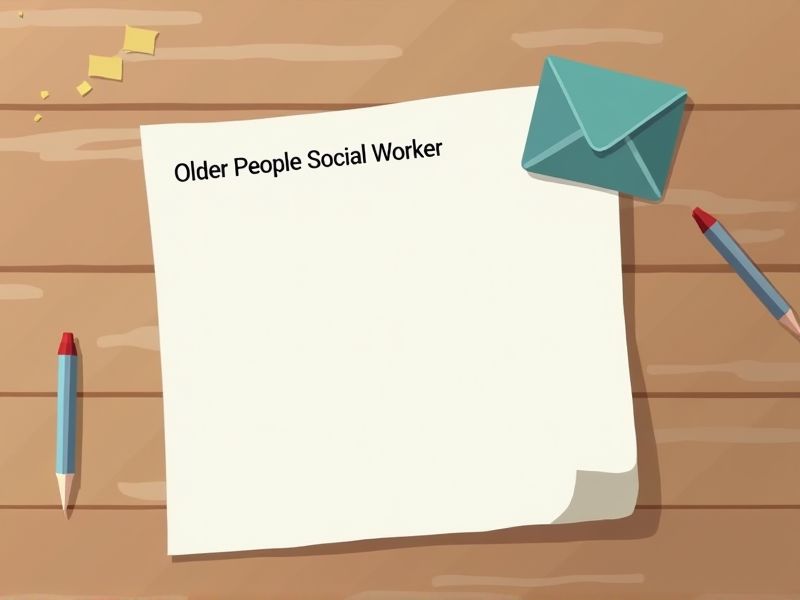
The role of an Older People Social Worker involves navigating complex healthcare systems, assessing individual needs, and advocating for elderly clients. Specialized certifications ensure that social workers are equipped with the necessary skills to address the unique challenges faced by older adults. Certifications also demonstrate a commitment to maintaining high professional standards and staying current with best practices. Some important certifications relevant to this field include those focusing on gerontology and elder care management.
Licensed Clinical Social Worker (LCSW)
The complexities of aging, such as cognitive decline and health issues, necessitate the specialized skills of an LCSW. Social isolation and mental health challenges like depression and anxiety are prevalent among older adults, making professional intervention crucial. An LCSW provides tailored care plans and effective resource navigation, facilitating access to essential services. Knowledge of ethical and legal considerations ensures that elder care is both compassionate and respectful.
Certified Geriatric Social Worker (CGSW)
The aging population requires specialized care, and a Certified Geriatric Social Worker (CGSW) is trained to address the unique needs of older adults. Increased life expectancy raises the incidence of conditions like dementia and chronic illnesses, making expertise in geriatric social work crucial. Ethical and legal complexities in elder care necessitate specialized knowledge that a CGSW possesses. A CGSW provides tailored support, enhancing the quality of life for older individuals by navigating healthcare, social services, and family dynamics effectively.
Certified Dementia Practitioner (CDP)
The increasing prevalence of dementia among the elderly creates a greater demand for specialized knowledge, making the Certified Dementia Practitioner (CDP) credential valuable for social workers aiding older individuals. Social workers equipped with CDP training can apply evidence-based interventions to enhance the quality of life for dementia patients. Understanding dementia-specific communication techniques through CDP enhances the effectiveness of interactions between social workers and patients. The CDP certification ensures social workers are current with best practices, which leads to improved outcomes in dementia care.
Certified Aging-in-Place Specialist (CAPS)
The growing aging population requires specific home modifications to facilitate safe and independent living, making Certified Aging-in-Place Specialists (CAPS) essential for social workers. By understanding the principles of CAPS, social workers can identify potential hazards in clients' homes and recommend effective solutions. This expertise allows them to guide families in making informed decisions about long-term living environments. Specialized CAPS knowledge enhances social workers' ability to advocate for older adults' needs in community planning and policy-making.
Hospice and Palliative Care Social Work Certification
Hospice and Palliative Care Social Work Certification ensures social workers have specialized knowledge in managing end-of-life issues, which older people frequently face. This certification equips social workers with skills to offer emotional and psychosocial support to elderly patients and their families during critically challenging times. Certified professionals are better prepared to navigate healthcare systems and coordinate necessary services for terminally ill older adults. The certification promotes professional credibility and trust with families, crucial for sensitive decisions surrounding palliative and hospice care.
Certified Social Work Case Manager (C-SWCM)
Older adults often face complex challenges related to health, housing, and social services, making C-SWCMs crucial for navigating these systems effectively. These case managers possess specialized knowledge in gerontology, enabling them to address age-specific issues such as dementia or elder abuse. By having certification, C-SWCMs demonstrate their commitment to ethical and competent practice, which builds trust with older clients and their families. Evidence suggests that tailored case management can significantly improve the quality of life and access to necessary resources for older individuals.
Certificate in Gerontology
A Certificate in Gerontology equips social workers with specialized knowledge about the aging process, enhancing their ability to address the unique needs of older adults. Understanding gerontological principles allows social workers to develop more effective care plans tailored to the elderly. Knowledge from this certificate improves communication techniques, crucial for building trust and rapport with older clients. This education also ensures social workers are aware of the latest best practices in elder care, promoting higher standards of service.
Certified Elder Abuse Prevention Specialist
Certified Elder Abuse Prevention Specialists bring essential expertise in identifying and addressing elder abuse, ensuring older adults receive protection and support. When social workers collaborate with certified specialists, they enhance their ability to recognize signs of abuse and implement effective intervention strategies. Specialist involvement in social work teams contributes to developing targeted prevention programs that proactively address potential abuse risks. Their expertise ensures that social workers have access to the latest legal and ethical guidelines, optimizing care for vulnerable older populations.
Trauma-Informed Care Certification
Older adults often experience a range of trauma-related issues, including past abuse or neglect, which can complicate their current mental health and well-being. Trauma-Informed Care Certification equips social workers with the necessary skills to recognize and address these complex needs, fostering a more compassionate and effective approach. Certified social workers can implement interventions that reduce retraumatization and build trust with older clients, enhancing their overall care experience. Empirical studies suggest a positive impact on treatment outcomes and client satisfaction when professionals are adequately trained in trauma-informed care.
First Aid and CPR Certification for Healthcare Providers
Older people face a higher risk of medical emergencies, requiring social workers to have immediate life-saving skills through First Aid and CPR certification. Social workers often serve as first responders for older individuals, necessitating their ability to stabilize critical situations before medical professionals arrive. This certification enhances the social worker's confidence and competence in handling health crises, leading to improved outcomes for seniors. The training equips them with knowledge on age-specific techniques and precautions, crucial for attending to older populations.
Summary
When you obtain certifications as an older people's social worker, your professional credibility is likely to increase. This enhanced credibility often leads to greater trust from clients and employers. With certifications, job opportunities and career advancement become more accessible due to proven competency. Certified social workers may also experience improved job performance through advanced skills and knowledge.
